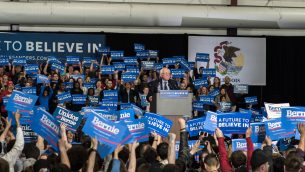Political Communication

Decoding Morality in the 2020 U.S. Presidential Election: A Public Relations Perspective
Moral Foundations Theory (MFT) was developed by psychologists to explore and explain why people around the world hold similar moral values despite having divergent cultural experiences. MFT identifies five “moral intuitions,” or deeply held moral values. These include harm/care, fairness/reciprocity, ingroup/loyalty, authority/respect and purity/sanctity.
While MFT is used primarily in psychology and political science, a research team from the University of Florida College of Communications and Journalism (UFCJC) used this moral framework to study the political rhetoric, agendas and strategies of Joe Biden and Donald Trump in the 2020 U.S. Presidential elections.
The team, led by UFCJC doctoral student Brittany Shaughnessy, included doctoral student Nader Dagher, doctoral graduates Osama Albishri and Phillip Arceneaux, and Executive Associate Dean and Public Relations Professor Spiro Kiousis.
Their research delves into the web of political communication to unravel hidden threads of moral intuitions woven throughout Biden and Trump campaigns’ strategies. The team analyzed nearly 8,000 data points including news articles from both liberal and conservative media—The New York Times, Washington Post, Wall Street Journal, CNN and Fox News—as well as campaign news releases, debates, Twitter content and Facebook content. The data were collected from Aug. 23, 2020, the final day of the Democratic convention, until Election Day on Nov. 3, 2020.
The team posed two questions at the onset of their study: “What moral intuitions were used by U.S. presidential candidates during the election?” and “What moral intuitions were used by the media during the election?” They merged the realms of agenda-building and MFT to uncover the strategic use of moral sentiments in shaping public discourse. It explores the moral foundation of each candidate’s messages.
The study first examined issues that took center stage for both campaigns, such as the economy, civil unrest, defense and COVID-19. While there were overlaps, each candidate brought their own distinctive twist to the narrative. Biden’s emphasis on certain issues like crime, civil unrest, the economy and COVID-19 matched the issues covered by the media more closely than Trump’s prioritized issues.
Moving beyond policy issues, the research explored the moral intuitions that campaigns infused into their political rhetoric and uncovered moral nuances in the candidates’ messages.
Both Biden and Trump leaned heavily on the harm/care moral intuition, emphasizing the human impact of their proposed policies. This underscores a common ground in their approaches, challenging previous notions of stark moral divides between liberal and conservative politicians.
One of the study’s key findings is the reciprocal relationship between campaign messages and media coverage. It’s not just about what the candidates say. It’s about how the media echoes and amplifies those messages.
The Biden campaign aligned more closely with media coverage, suggesting they did a better job managing news and public relations strategies. This correlation extended beyond issues, stakeholders and moral intuitions, underscoring their ability to set the narrative.
The research holds valuable lessons for the future. For public relations practitioners, it offers data-driven support for the effectiveness of news management strategies. Understanding how to leverage media coverage can be a game-changer for not only political campaigns but also corporations.
The divisiveness of the U.S. political theatre creates a need to better understand the moral drivers of candidates, their messages, public policy and media.
“Focusing on the context of political elections specifically, this study holds practical contributions for election campaigning,” write the researchers. “Given the rise of hostile electoral campaign strategies since President Trump’s 2016 campaign, the quality of democratic discourse and debate has frayed alongside continuing polarization of U.S. politics.”
The original article, “Morality on the ballot: strategic issue salience and affective moral intuitions in the 2020 US presidential election,” was published in the Journal of Communication Management, October 2023.
Authors: Brittany Shaughnessy, Osama Albishri, Phillip Arceneaux, Nader Dagher and Spiro Kiousis.
This summary was written by Gigi Marino.
Posted: December 21, 2023
Tagged as: Brittany Shaughnessy, Moral Foundations Theory, Nader Dagher, Osama Albishri, Phillip Arceneaux, Political Campaigns, Spiro Kiousis


